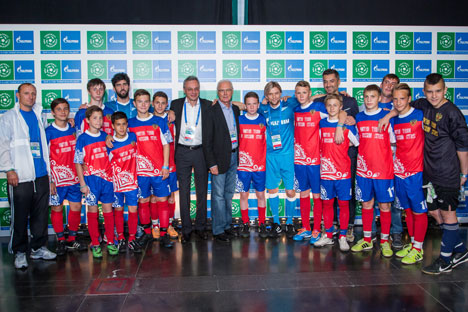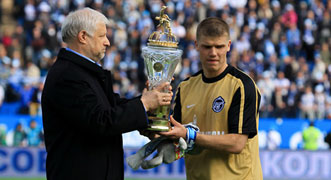Big football for little Europeans

Football for Friends is social initiative implemented by Gazprom. Source: Press Photo
Last weekend, the Estoril Congress Center in the suburbs of Lisbon became a representative of sporting multiculturalism. From May 23 to 25, Russian oil behemoth Gazprom gathered 16 youth teams from different European countries in the capital of Portugal for the Football for Friendship tournament.
"The goal of our project is to instill in the young generation a passion for sports, as well as important human values: respect for other cultures and nationalities, equality, and interest in a healthy lifestyle," said Vyacheslav Krupenkov, Senior Managing Director of Gazprom Germania GmbH.
The tournament was being held for the second time. Last year, Gazprom was able to assemble eight teams in London. This year, in Lisbon, they were able to double the number, and Gazprom feels that this is not the end. Krupenkov has promised to double the number of participants again at the next event, which is to be held in Berlin.
The Lisbon tournament, however, already boasts big names. Youth teams of 12- to 14-year-olds came to the banks of the river Tezhu (Tagus) from many of Europe’s leading clubs: FC Chelsea, FC Schalke 04, S.S. Lazio, Galatasaray Istanbul, Red Star Belgrade, and others.
The Russian team, on the other hand, was a national team consisting of football players from 11 of the Russian cities that will host matches in the 2018 World Cup.
No losers out here
The youth event coincided with the Champions League Final, and the opportunity to see the biggest club game in European football was almost a bigger attraction for the young players than the tournament itself. "We’ve come here to visit the Champions League final, we’re just having fun and enjoying the games," said the goalkeeper of the Serbian team, Milos Gordic.
Its own championship, which was held in two small playgrounds for street football, turned out to be quite a whirlwind; the winner was determined by the end of the second hour. In the final, the Portuguese team, which consisted of players from Benfica, outplayed the powerful Serbs from Red Star Belgrade.
Alexander Tarkhanov, Russian football Coach: Tournaments like football for Friends are very important. The more that is done for children, the better. I think that Gazprom is on the right path. Franz Beckenbauer highly praised the organizers, which means a lot.
The Russian team came in third place, leaving the Turks out of the running in the third place play-off.
Those who did not succeed in advancing through the tournament stages gladly shared their impressions with the journalists. "It's a great competition, here you can just play the game, and if you lose, you don't have to go away," said Philipp Julie from Germany.
"It's a lot of fun to spend time here with friends, all the people around are very friendly," said Zhenya Arkhipov from FC Arsenal Kiev.
Girls vs. boys
The Dutch team surprised many, having presented a mixed team of boys and girls. The "Oranges" lost in the quarter finals to the physically stronger Russian team.
"It's hard to play against boys at this age, that's what makes the difference between the teams and maybe why we lost," said Emma van der Worst of the the Dutch team, speaking after the game.
Thomas De Groen, the coach of the Dutch team, said that next time he is going to urge other countries to bring mixed teams as well.
The language of football and life
The Football for Friendship tournament ambassador, German football legend Franz Beckenbauer, used the following quote from the recently deceased Nelson Mandela to describe the events: "Sport has the power to change the world."
As it is, while the players on the field were able to find a common language, off the pitch the teams were noticeably fragmented. Most of the kids said that they did not converse with their peers from other countries. If you doubt the unifying role of sport is unnecessary, then you need to think of how to tear down the wall of the language barrier.
"In the first half, Real just wasn't noticeable. Is this really the game of the royal club?" one of the players from the Russian team asked as he continued to discuss the ups and downs of the final match of the Champions League the next day on the plane to Moscow.
Before the match, the tournament participants voted that Real would win, and a few hours later they were able to see their prediction come true. The dramatic duel between the two clubs from Madrid in the Estadio da Luz stadium did not leave anyone indifferent.
"Goodbye, Lisbon, maybe we'll see each other again," was heard from the front of the cabin as the jet soared above the red roofs of the Portuguese metropolis on its way home.
Football for Friends is the social initiative implemented by Gazprom. Many Russian companies support sports initiatives, but most of these are one-off events. In 2009, the oil company Lukoil organized the campaign "Pover v Sebya" (Believe In Yourself), which aimed to support sports in the region.
Around 8,000 people took part in competitions throughout Russia, and Lukoil helped purchase much-needed equipment for sports clubs. In 2012, Sberbank, together with the "Podari Zhizn" (Give Life) foundation, organized "Igry Pobeditelei" (Games of Winners), a competition for children suffering from cancer. Over 350 children from 12 countries participated in the tournament.
Read more: 5 authentic sports in which the U.S. will never surpass Russia>>>
All rights reserved by Rossiyskaya Gazeta.
Subscribe
to our newsletter!
Get the week's best stories straight to your inbox

